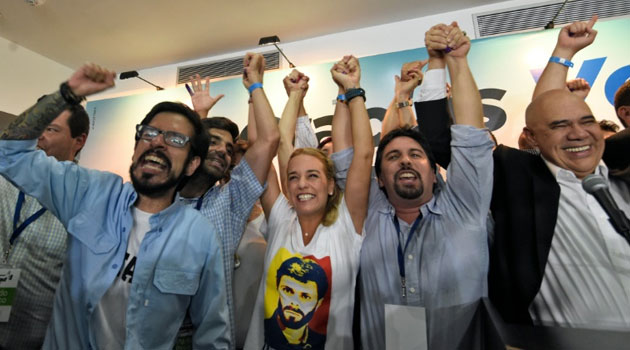Maduro’s opponents are racing to call a referendum before January 10, as a successful recall vote before that deadline would trigger new elections rather than transfer power to the vice president.
If the opposition meets all requirements with their bid to oust him, “the recall referendum will be held next year. Period,” the elected leftist populist said.
For months now, Maduro has faced increasing hostility, with opponents accusing him of driving oil-rich Venezuela to near economic demise and launching a marathon process to call a vote on ousting him from office.
Maduro’s comments came after the National Electoral Board (CNE) announced it would take fingerprint scans from June 20 to 24 to confirm the identity of 1.3 million people who signed the opposition’s referendum petition.
The South American country’s state-led economy has seen its situation veer from bad to desperate, with long lines for basic items such as rice or corn meal, looting and black marketeering now everyday scenes.
Seven in 10 Venezuelans want Maduro to go, according to polls.
“We must respect whatever the electoral authorities” decide, Maduro said at a pro-government event in Caracas.
– Too late for referendum bid? –
Opposition members have said that they want the vote to be held in October or November 2016.
But the president insisted that they missed their chance.
“If they had wanted to seek a referendum this year, they would have to have requested it by January 11 of this year, for them to have had enough time, if all legal requirements were met,” Maduro said.
The referendum petition was submitted early last month.
Maduro said Saturday the government would be suing to have the referendum request itself revoked, filing such a measure at the Supreme Court on Monday. He maintained that fraud was committed, claiming that the rolls of signatures included 11,000 dead people and 2,000 convicts.
Once 1.3 million signatures are verified, the opposition would have to gather four million more over the course of three days to trigger a recall vote.
The opposition maintains that the CNE rejected 600,000 signatures for reasons such as spelling mistakes. “There are 600,000 of us who cannot even go and validate our signatures,” said Juan Carlos Caldera, an opposition liaison who communicates with the CNE.
In Washington, meanwhile, the Organization of American States announced late Friday a special session of its permanent council on June 23 to discuss the situation in Venezuela.
The meeting was called by OAS Secretary General Luis Almagro, who warned of an “institutional crisis” in Venezuela that requires “immediate changes in the actions of the executive branch.”
Protests, looting and violent crime have been mounting in Venezuela as the country reels from shortages of food, water, medicine and electricity.
On Thursday, police fired tear gas to break up a protest led by lawmakers in the opposition-majority congress, who tried to march on the CNE’s headquarters.
A brawl broke out and punches flew when the protesters faced Maduro supporters.
Maduro blamed the violence on his political enemies and vowed to throw the “provocateurs” into prison.
– New looting erupts –
In a sign of growing unrest, new looting broke out overnight in Petare, a sprawling, impoverished neighborhood in eastern Caracas, when residents descended on two food delivery trucks and 10 businesses, carting off their stock.
“People are going out and looting because they’re hungry. They can’t find any food,” said Robert Arcila, a 22-year-old who sells eggs on the street and was nearby when looters sacked a truck hauling sausages and cheese.
“All of Venezuela’s crises are converging,” said Amnesty International’s Erika Guevara, the rights group’s director for the Americas.
Home to the world’s largest oil reserves, Venezuela has taken a punishing beating from the sharp drop in the price of crude, on which its economy is built.
It is stuck in a deep recession and its inflation rate is the highest in the world.
Exacerbating the situation, a drought has dramatically cut output at the country’s hydroelectric dams, forcing the government to implement daily power cuts and close state offices all but two days a week.










































